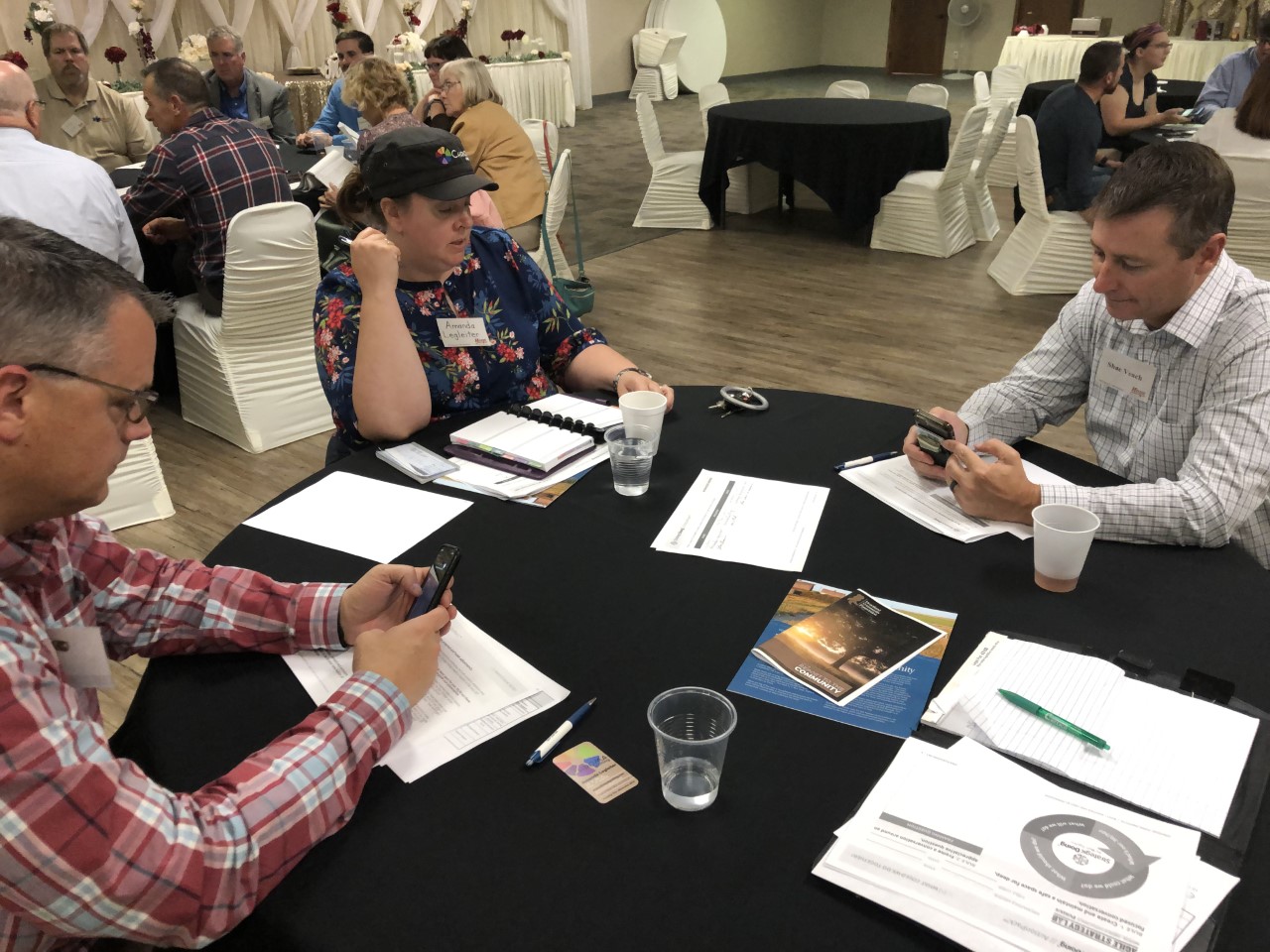
By BECKY KISER
Hays Post
Designing a strategic plan for the future of Ellis County drew the biggest interest and group during Tuesday night’s meeting of the Strategic Doing Re-Start for Ellis County.
Volunteers gathered at the Rose Garden Banquet Hall in Hays to winnow down the number of project ideas for community improvements generated at a meeting last month.
As attendees enjoyed bierocks and green bean dumpling soup, facilitator Betty Johnson, Lawrence, polled the group for their top topics. Many of the people had been at the first meeting and others were there for the first time.
The voting yielded eight more areas of interest.
• More after-school activities for middle and high school students
• Decreased domestic violence and human trafficking
• Increased volunteerism in Ellis County
• Reaching out with help and understanding of mental health and anxiety
• More childcare providers
• Improved cultural diversity
• A multi-generational center
• Mentoring young entrepreneurs.
The nine groups spent more than two hours talking about what they could do. Discussions began with broad suggestions and then narrowed to specific action items with deadlines.
A spokesperson from each group explained the purpose of their project and the plan to move it forward.

“Our next steps through April of 2020 is to create a visioning process,” said Henry Schwaller, referring to the Ellis County strategic plan. “It will begin with a large meeting to get as many (residents) to the table as possible to tell us what they want this community to look like over the next five years.”
A much smaller group of three people is working on providing fun hands-on STEM learning projects after school for students in sixth grade through high school.
Many students participate in sports after school, but there’s a gap in other activities, according to the group, and they want to help fill the void.
“We want to ask kids if they’d rather learn how to build a video game instead of just playing them,” said Alan Wamser. As the IT manager at HaysMed, Wamser has a vested interest in the project.
“If we can get a college intern with IT experience and bring them in, they’re the most successful,” he said.

“And kids love to make YouTube videos and podcasts,” added group member Amanda Legleiter
The career exploration opportunities would involve teaching by local IT professionals as well as students and instructors at Fort Hays State University and NCK Tech.
“It could be similar to 4-H with the older kids or students teaching the younger ones,” Legleiter said.
“With mentoring, the kids may go on to FHSU to major in computer science or graphic design,” said the group’s spokesman, Shae Veach, HaysMed vice president of regional operations. “STEM activities can lead to scholarships, empower these students with confidence and possible local careers.”
The trio also tossed around ideas for funding and sustainability of the program as well as who will be stakeholders.

The group interested in mental health issues is working on “Can We Just Talk?,” bringing together people who are willing to listen and people who need to talk about their problems.
Kansas has had a record number of domestic-related homicides, according to Shaelin Sweet, community advocate for Options, who spoke for the group wanting to curtail domestic violence and human trafficking.
“That’s not a record we want to be breaking. The ultimate goal is for domestic homicides to go down and that will happen through education of law enforcement in the community,” she said.
Hays Police Chief Don Scheibler is a member of the group.
Strategic Doing is coordinated by the Heartland Community Foundation of Ellis, Trego and Russell counties with a grant from the Dane G. Hansen Foundation in Logan.

“I’m walking around this room and the focus in these groups is just amazing to me,” said Sandy Jacobs, HCF executive director. “We want to be all the resource to you we can. If you need help finding meeting sites, if you need help getting information out, anything you need just call our office.”
By 8:30 p.m. each table had talked through and filled out a Strategic Doing Action Pack from Purdue. The university’s Agile Strategy Lab offers training and certification in Strategic Doing.
According the to university’s website, Strategic Doing enables people to form action-oriented collaborations quickly, move them toward measurable outcomes, and make adjustments along the way.
Johnson is a certified facilitator in the Strategic Doing process.
“It’s been tried and proved. It’s used globally. We have used it in so many large, large operations as well as small,” she told the crowd. Johnson’s position is funded by the Hansen Foundation.

Erin Hughes was hired in June as a part-time assistant to Jacobs. Hughes will compile information completed by the groups. The results will be presented and project work updated at the next Strategic Doing meeting six months from now.
In the meantime, the nine groups are to meet every 30 days or so to review their progress.
Jacobs also encouraged the groups to invite other Ellis County residents to join their causes.
“If you know people that want to get involved after you begin talking about it in the community, for goodness sake, bring them into your group and get it started,” she urged.
“That’s how these things grow and win.”
